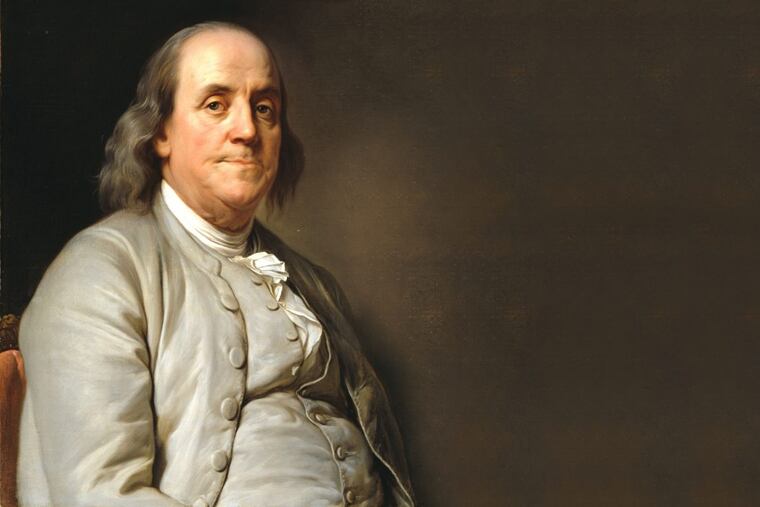Medical mystery: A founding father's foot infirmity
Benjamin Franklin came up with many inventions and innovations in his long life. But he couldn't solve his own health problems.

Founding Father Benjamin Franklin (1706-1790) was regarded by many as his young nation's preeminent citizen, and he remains history's most famous Philadelphian.
His contributions to the city and nation are impressive and varied: first postal service, first volunteer fire service, first public library, even the first public hospital, the Pennsylvania Hospital.
Though Franklin didn't have much of a formal education – just two years of schooling — his keen intellect and talent for invention ranged widely and included health and science. He apprenticed in his brother James' Boston print shop, publishing one of America's first newspapers. When James severely admonished him for writing articles under a pen name, the teenager took off for Philadelphia.
In 1724, at age 19, he sailed to London to study the printing trade. Two years later, he had his own shop in Philadelphia, and soon began publishing the Pennsylvania Gazette.
As the publisher of Poor Richard's Almanack, under the pseudonym Richard Saunders, he dispensed all kinds of advice, including this famous piece of wisdom: "Early to bed and early to rise, makes a man healthy, wealthy, and wise."
Franklin's success as a printer led him to become a civic leader of the colonies. In addition to the many public services he helped found, he also founded the American Philosophical Society in 1743, and, in 1749, he set up an academy that became the University of Pennsylvania.
Curious and creative, Franklin invented the Franklin stove and the lightning rod, and performed his famous kite and key experiment, establishing the connection between lightning and electricity.
His inventions also ranged into health matters: He developed the first bifocals (which he called "double spectacles"), noted the health implications of lead, which he handled as a printer, and was an early advocate of smallpox inoculation. When his brother John had pain while urinating because of kidney stones, Franklin invented a flexible bladder catheter to help him and other sufferers.
As a young man, he was a vegetarian for a time, and an exercise devotee, endorsing swimming, in particular, and also lifting weights.
As he reached middle age, he began experiencing acute foot pain. When he was 56, he complained in a letter to his sister, Jane, of the problem. As his attacks became more frequent and severe, they affected his diplomatic assignments. In 1779, as ambassador to France, he needed to use a wheelchair and was not able to attend a diplomatic meeting at Versailles.
What was the cause of this terrible foot pain?
Solution
Franklin suffered from recurrent bouts of gout, a form of inflammatory arthritis associated with high levels of uric acid in the blood. In the last 15 years of his life, his gout attacks became longer and fiercer.
During one bout in France, he may have received colchicine for relief, an ancient remedy for rheumatism and swelling found in a plant called autumn crocus. Colchicine, first isolated in 1820 by a pair of French chemists, is still used today for gout.
In 1776, uric acid was discovered by Swedish German scientist Carl Wilhelm Scheele, who found it in kidney stones and urine. But it's not known whether Franklin was aware of the discovery.
About 20 percent of gout sufferers, without therapy, will develop kidney stones made from uric acid, not calcium oxalate. Family history revealed that Franklin's brother had kidney stones, pointing to familial, genetic uric acid abnormality.
Franklin's lifestyle, including a diet high in purines (found abundantly in meat and beer), can result in uric acid synthesis and gout. What's more, as a printer for many years, Franklin was exposed to lead type daily. Lead and gout have been linked; lead exposure is suspected as a cause of gout by inhibiting urinary uric acid excretion.
Although Franklin disclosed that he understood his diet and sedentary lifestyle could be the causes of his gout, he did not give up his favorite foods, especially wine. The pain he suffered likely precluded much physical activity.
Before long, he suffered more than foot problems.
At age 82, in 1787, Franklin began experiencing acute abdominal pain, thought to be caused by a urinary bladder stone, according to an American Philosophical Society record. Surgical removal was considered too risky in those pre-anesthesia, pre-sterile technique days, especially for someone of Franklin's age. The stone was never recovered, but it was most likely composed of uric acid, completing the painful duet of gout and kidney stones.
Franklin died in 1790 of pleurisy, a painful inflammation of the tissue lining the lungs and chest.
Today, uric acid crystals are easily recovered and identified under the microscope. Treatment for acute gout includes colchicine or NSAIDS (anti-inflammatories), and chronic therapy includes probenecid, a medication that prevents gout attacks by increasing urine uric acid excretion, and allopurinol, which decreases levels of uric acid synthesis.
Also important are lifestyle changes, including avoiding alcohol, limiting animal protein consumption, maintaining a healthy weight, eating a balanced diet, and drinking a lot of fluids, preferably water.
Allan B. Schwartz, M.D., is a professor of medicine in the Division of Nephrology & Hypertension at Drexel University College of Medicine.